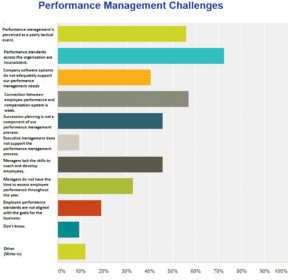Performance Reviews Are a Process Not an Event
(Editor’s Note: Today’s post is brought to you by our friends at SilkRoad, a leading global provider of cloud-based, end-to-end talent management solutions. SilkRoad hosts a virtual book club – just sign up and receive access to over 30 chapters from popular talent management topics. Enjoy the post!)
In Steve Boese’s “What’s in Store for HR Tech for 2016”, top on the list was rethinking performance management. Over the past couple of years, we’ve heard plenty of conversations about performance reviews. The verdict? Everyone hates them. And in response, some organizations are working toward eliminating the annual performance review.
But here’s the thing. Performance feedback is absolutely necessary. Employees want to know how they are doing on the job. “No news is good news” isn’t a performance management philosophy. Regular performance feedback increases engagement, improves overall organizational performance and helps with employee retention. So, regardless of what you call it, the idea behind the performance reviews is feedback. And feedback is valuable.
The question becomes, what steps can organizations take to make their performance reviews effective. After reading SilkRoad’s 2015 Performance Management survey, I think part of the challenge is that 55 percent of organizations viewed performance reviews as an “event” versus a process. For performance feedback to be effective, it needs to be a process. Which means that performance reviews need to be viewed as a process.
Events are defined as “a thing that happens.” As such, the outcomes of an event can change regularly. Events are not ingrained in the culture, so they might not receive the support and resources they need to be successful.
Processes are “a series of actions or steps taken in order to achieve a goal.” Processes have a defined consistent goal. They are a regular part of the business operation and viewed differently. Resources are allocated to the process because it helps achieve a goal.
Even though the SilkRoad survey did note that the annual review is still the most common frequency (62 percent), with semi-annual a distant second (22 percent) and quarterly at 8 percent, performance reviews were never meant to be once-a-year events. Well, OK, maybe there was supposed to be a once-a-year written recap conversation. I’ll give ya that one. But over time the annual performance review moved away from its original intent – to provide performance feedback.
That’s what employees want to hear – regular performance feedback conversations throughout the course of the year. Also, please note the organizations making the news by announcing that they are “ditching” the performance review aren’t saying that they’re ditching performance feedback. What they’re saying is they’re ditching the event and adopting a process.
So how do we make performance reviews an ongoing process of feedback? The SilkRoad survey has some great starters within their survey results.
Create consistent performance standards. 72 percent of survey participants indicated their organization has a challenge with inconsistent performance standards. Organizations need performance standards as part of their consumer brand, product quality standards, and customer service just to name a few. Employee performance should be measured against the standard.
Get consistent support from management. It might not seem like a big deal to only have 9 percent of survey respondents express concern about management support. But if the organization has a clear performance standard that aligns with the business, then why wouldn’t management be completely onboard?
Build an effective process. Speaking of management support, the other aspect to management support that bears mentioning is, once the organization is committed to the process, resources need to be allocated to make the process work. Performance management technology solutions can reduce administrative burden, freeing up managers and human resources to focus on delivering feedback.
Train managers to provide consistent feedback and communication. Over half of survey responses expressed concern about managers providing consistent feedback (56 percent.) Regardless of the performance review, feedback conversations still need to happen. And they need to be effective. Giving managers training and guidance benefits the employee and the company.
Changing people’s opinions about the performance review isn’t going to happen overnight. But if there’s one thing that can make a significant change, it’s viewing performance reviews as a process. This shift in mindset can help the organization build a performance review process that gets the support needed in terms of technology solutions and manager training to achieve the company’s goals.
3